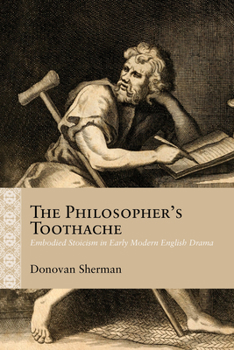The Philosopher's Toothache: Embodied Stoicism in Early Modern English Drama
(Part of the Rethinking the Early Modern Series)
Select Format
Select Condition 
Book Overview
The Philosopher's Toothache proposes that early modern Stoicism constituted a radical mode of performance. Stoicism--with its focus on bodily sensation, imagined spectatorship, and daily mental and physical exercise--exists as what the philosopher Pierre Hadot calls a "way of life," a set of habits and practices. To be a Stoic is not to espouse doctrine but to act. Informed by work in both classical philosophy and performance studies, Donovan Sherman argues that Stoicism infused the complex theatrical culture of early modern England. Plays written and performed during this period gave life to Stoic exercises that instructed audiences to cultivate their virtue, self-awareness, and creativity. By foregrounding Stoicism's embodied nature, Sherman recovers a vital dimension too often lost in reductive portrayals of the Stoics by early modern writers and contemporary scholars alike. The Philosopher's Toothache features readings of dramatic works by William Shakespeare, Cyril Tourneur, and John Marston alongside considerations of early modern adaptations of classical Stoics (Seneca, Epictetus, and Marcus Aurelius) and Neo Stoics such as Justus Lipsius. These plays model Stoic virtues like unpredictability, indifference, vulnerability, and dependence--attributes often framed as negative but that can also rekindle a sense of responsible public action.
Format:Paperback
Language:English
ISBN:081014414X
ISBN13:9780810144149
Release Date:November 2021
Publisher:Northwestern University Press
Length:208 Pages
Weight:0.57 lbs.
Dimensions:0.5" x 6.0" x 9.0"
Customer Reviews
0 rating





